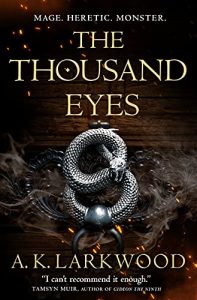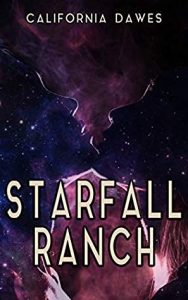Amazon Affiliate Link | Bookshop.org Affiliate Link
When I reviewed The Unspoken Name by A. K. Larkwood, this is what I wrote:
The novel ends with the promise of more adventures to come, and I would certainly love to see more of these characters and this world. But if it turns out this was a stand-alone work, I’d be okay with that.
Well, you’ll never guess what happened.
The Thousand Eyes is the second book in the Serpent Gates series by A. K. Larkwood, following her debut novel The Unspoken Name. But, in a move that seems intended to contradict everything I wrote in my previous review, The Thousand Eyes is a startlingly different book from its predecessor. Larkwood’s writing is still snappy and her character voices enjoyable, but the plot has turned from something predictable and satisfying into a narrative primarily defined by twists and anxiety.
The novel picks up two years after the end of the first book, with Csorwe, Shuthmili, and Tal making a life for themselves guarding archeological expeditions in the Echo Maze. Instead of exploring new territory in Larkwood’s imaginative collage of colliding fantasy worlds, however, The Thousand Eyes seems intent on retreading familiar ground—Iriskivaal, Echentyr, and of course the previous book’s villain, Belthandros Sethennai. But before I could even cultivate any proper disappointment at this, Csorwe is suddenly possessed by a fragment of the dead snake goddess. Shuthmili can’t save her, so she swears fealty in a desperate hope that time will give her an answer. And then the book jumps fifteen years into the future.
Yes, fifteen years. The worlds we knew are being trampled underfoot by an empire reborn, and our characters are either dead or have been hardened and harrowed by a decade and a half of violence and despair. Chapters from Shuthmili dwindle in number; by the halfway point, it feels more like Tal’s story than anyone else’s. Even as the novel kept me nervously turning pages, I found myself nurturing a sick hope that perhaps some plot contrivance could undo all this, could rewind the clock and return the story back to where it was at the beginning. Which is certainly an emotional investment to have in a novel, but I can’t imagine it’s what the author intended me to feel.
The reason I said in my review of The Unspoken Name that I would be alright with it remaining a stand-alone novel is that the book’s ending perfectly enables readers to imagine the many thrilling and romantic adventures that Csorwe and Shuthmili could have together. The potential is there, and sometimes that’s enough. But in one fell swoop, The Thousand Eyes takes all the promise from the end of The Unspoken Name and erases it.
One of The Unspoken Name’s primary themes was choice—Shuthmili chose to live with the woman she loved, even if it meant dying young to mageblight, rather than live long tethered to her rigid society with no individual will. Csorwe gave up the approval of her adopted father and all the power and privilege he could offer, and even faced the terror of her religious upbringing, all to be with Shuthmili. These are incredibly relatable lesbian experiences illuminated in the colorful pageantry of fantasy adventure! But now, nothing’s come of it. The choices that Csorwe, Shuthmili, and even Tal made pale in consequence to this much larger, darker portion of their lives. All the adventures that could have occurred, now we know for certain were never meant to be.
What hurts most is that The Thousand Eyes is still a well written book, one that the author clearly believes in. Her heart is in this story—but sadly, mine isn’t. If there is ever a third novel in the Serpent Gates series, it seems likely it will put the lesbians aside as protagonists in favor of Tsereg, the new non-binary teenage embodiment of the Unspoken. The abrupt change in main characters may be some readers’ cup of tea, certainly, but it isn’t mine. I think I’ll be getting off the Maze ship here, with my slightly bruised heart and my dreams of what might have been.
Samantha Lavender is a lesbian library assistant on the west coast, making ends meet with a creative writing degree and her wonderful butch partner. She spends most of her free time running Dungeons & Dragons (like she has since the 90’s), and has even published a few adventures for it. You can follow her @RainyRedwoods on both twitter and tumblr.


